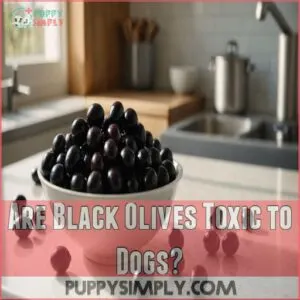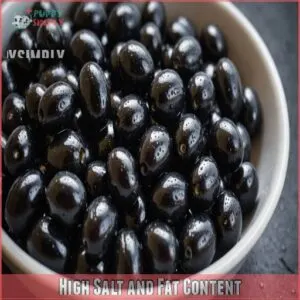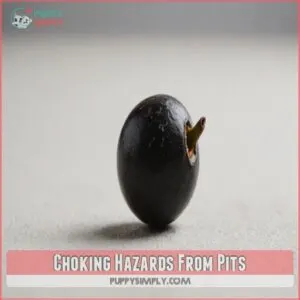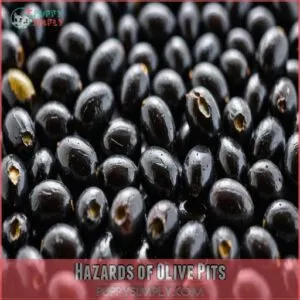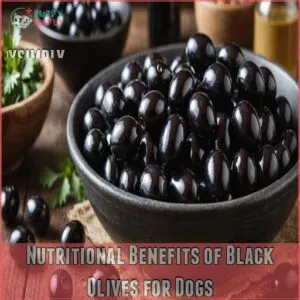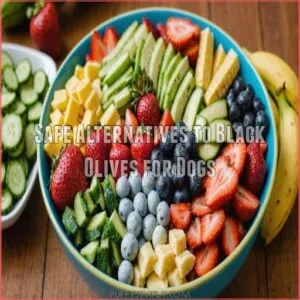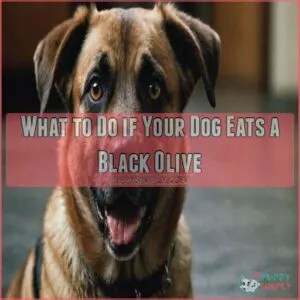This site is supported by our readers. We may earn a commission, at no cost to you, if you purchase through links.

However, these little Mediterranean morsels are high in sodium, which isn’t great for dogs. Too much salt could lead to dehydration or even sodium poisoning.
Plus, if the olives have pits, they become choking hazards! As with many snacks, moderation is key. It might be safer to treat your pup with something specifically made for dogs. Curious about healthier options for your canine companion? Keep snooping around for some tantalizing tips!
Table Of Contents
- Key Takeaways
- Are Black Olives Toxic to Dogs?
- Risks of Feeding Black Olives to Dogs
- Can Dogs Eat Black Olives With Pits?
- Nutritional Benefits of Black Olives for Dogs
- Safe Alternatives to Black Olives for Dogs
- What to Do if Your Dog Eats a Black Olive
- Frequently Asked Questions (FAQs)
- Can dogs eat black olives?
- Can dogs eat green olives?
- Can dogs eat olives if they have pits?
- Can dogs eat olives if they are overweight?
- What happens if my dog eats a black olive?
- Can dogs eat olives with pimentos?
- Can dogs eat pickles?
- Are black olive trees safe for dogs?
- How often can dogs eat black olives?
- Can puppies safely consume black olives?
- Are canned black olives safe for dogs?
- How to prepare black olives for dogs?
- Can black olives affect a dogs weight?
- Conclusion
Key Takeaways
- Black olives aren’t toxic to dogs, but they’re high in salt and can be a choking hazard if they have pits. Moderation is crucial to keep your dog safe.
- If you’re sharing olives, opt for plain, unseasoned ones and always remove the pits to prevent choking or dental damage.
- When adding new foods like quinoa to your dog’s diet, which may be done by pre-soaking quinoa, it’s essential to monitor their digestive health closely. Keep an eye out for any signs of digestive upset if your dog eats black olives and consult your vet if you notice unusual symptoms.
- Healthier treat options for dogs include fresh fruits and vegetables, which are safer and more nutritious alternatives to olives.
Are Black Olives Toxic to Dogs?
If you’ve caught your pup eyeing those black olives on your pizza, you’ll be relieved to know they’re not toxic to dogs.
While your furry friend can safely nibble on plain black olives, you’ll want to be careful about portions since they’re packed with salt and fat.
Types of Olives and Their Risks
While plain green olives aren’t toxic to dogs, not all varieties are safe for your furry friend.
Stuffed olives often contain harmful ingredients like garlic or blue cheese, while marinated ones might be soaked in dangerous seasonings.
Olive oil can benefit your pup’s coat in small amounts, but too much leads to pancreatitis.
The biggest threat? Those pesky pits can be a serious choking hazard.
Black Olives and Their Safety
Black olives aren’t toxic to your furry friend, but they’re not exactly a health food either.
If you’re looking for products that cater to your dog’s olive consumption, check out dog olive safe products.
Think of them like that occasional french fry you sneak to your pup – okay in tiny amounts, but not something you’d want to make a habit of.
Plain, unseasoned black olives are the safest choice if you’re determined to share.
Just remember: moderation is key to keeping your four-legged friend happy and healthy.
Risks of Processed Black Olives
Most processed black olives contain additives that could upset your pup’s tummy.
Regarding these snacks, you’ll want to watch out for:
- High sodium content that can lead to dehydration
- Chemical preservatives that may trigger allergies
- While fruits like bananas and apples can provide essential nutrients for dogs, added sugars that aren’t part of a healthy dog diet
- Artificial flavors that might cause digestive issues
Instead, stick to plain, unseasoned olives as an occasional treat for your furry friend.
Risks of Feeding Black Olives to Dogs
While black olives aren’t toxic to your dog, you’ll want to think twice before sharing them as treats since they’re packed with salt and fat that can upset your pup’s stomach.
If you’re not careful about removing pits, these seemingly harmless snacks can also become dangerous choking hazards for your four-legged friend.
High Salt and Fat Content
Every dog owner knows that some popular human snacks, like pistachio ice cream with hidden xylitol risks(pistachio ice cream dangers), can pack a hidden punch.
Regarding black olives, you’re looking at a snack that’s loaded with salt and fat – not exactly your pup’s best friend.
Too much salt can lead to dehydration and kidney problems, while the high fat content might trigger pancreatitis.
If your dog’s on a special diet, these little Mediterranean morsels could throw their health plan off track.
Choking Hazards From Pits
While salt and fat are concerning, olive pits pose a serious choking risk for your furry friend.
These hard pits can get stuck in your dog’s throat or damage their teeth if they try to crunch down on them.
You’ll want to remove all pits before sharing olives with your pup.
Think of it like child-proofing – a quick check now prevents a scary emergency later.
Digestive Issues
Besides choking hazards, olives can upset your dog’s tummy.
Even small amounts might cause problems, and you can find products to help with dog olive diarrhea.
Here’s what you should watch out for:
- Olive-induced diarrhea
- Olive gas (lots of smelly farts!)
- General digestive upset
Remember, every dog’s different.
Some pups might’ve food sensitivities.
If you see anything unusual, call your vet.
Better safe than sorry!
Can Dogs Eat Black Olives With Pits?
You might wonder if letting your dog nibble on black olives with pits is safe, but it’s best to avoid it.
Olive pits can pose a serious choking hazard and might chip your dog’s teeth, which could lead to a costly vet visit.
Hazards of Olive Pits
Pits in black olives aren’t just crunchy little nuisances; they can seriously mess with your dog.
These pits pose a real choking hazard—imagine trying to swallow a slippery rock!
Plus, they’re tough enough to cause tooth damage.
If swallowed, pits might lead to digestive blockage, which could mean a trip to the vet.
Think of it like a tiny fruit stone causing a big, pesky problem.
It’s like when you bite into a hidden seed; it might hurt, but for dogs, it could result in internal injury.
Keep your pup safe by nixing those pits from their snacks!
What to Do if Your Dog Eats a Pit
Stumbling upon an olive pit is a bit like finding a surprise in a candy, except this surprise can be dangerous for your dog.
If Fido munches down on one, don’t panic—just stay calm.
First, check his mouth to see if the pit is still stuck.
If it’s swallowed, watch your pup closely.
Look out for choking, coughing, or any signs of distress.
If you notice anything off, it’s time to ring your emergency vet.
Occasionally, an X-ray might be needed to see if the pit’s causing trouble.
Remember, the dog’s safety comes first!
Nutritional Benefits of Black Olives for Dogs
Black olives can be a surprising source of nutrients for your dog, packing in Vitamin E, copper, polyphenols, and flavonoids that may boost skin health and reduce inflammation.
However, you’ll want to be cautious and consult your vet, as the fat and sodium content could outweigh these benefits.
Vitamin E and Copper Content
If you’re considering feeding black olives to your dog, you might wonder if there’s any upside.
Well, these olives do pack a punch with Vitamin E and copper.
Vitamin E benefits your dog’s skin and coat, while copper plays a role in avoiding deficiency issues.
So, thinking of adding these to the diet? Just remember moderation is key!
Polyphenols and Flavonoids
Explore the antioxidant benefits of black olives for your pup.
Packed with polyphenols and flavonoids, these tiny powerhouses might give your dog’s cells a healthy boost.
Think of them as nature’s little superheroes, swooping in to fight off free radicals.
Just like olive oil has numerous benefits, including enhanced skin and coat health, aiding weight management, and supporting immune and cognitive function can dogs eat olive oil in their food.
While they add a bit of excitement to a canine’s diet, always keep moderation in mind.
Adding natural dental chews, such as cooked turkey necks for joint health, can support your dog’s oral health. Healthier alternatives exist, like olive oil, for those extra canine health benefits.
Monounsaturated Fats and Calcium
A small amount of olive oil in your dog’s diet offers some cool benefits, much like the improved coat and skin health seen in Great Danes on a balanced raw dog food diet. A small amount of olive oil in your dog’s diet offers some cool benefits!
It’s packed with monounsaturated fats, good for their skin and coat.
Plus, olives contain calcium, which helps with strong bones.
However, too much fat isn’t good, so moderation is key.
Always check with your vet before adding anything new to their food.
They can help you avoid potential issues like Calcium Deficiency and make sure your pup gets the right balance of Fatty Acid Needs.
Safe Alternatives to Black Olives for Dogs
If you’re looking for snacks your dog will love, try offering fresh fruits and vegetables like apples, bananas, or cucumbers.
These options are delicious and they’re also much healthier than black olives and can keep your pup’s tail wagging happily.
Fresh Fruits and Vegetables
Fresh fruits and vegetables can be a real twist to your dog’s regular snack game.
Apples, carrots, and cucumbers are safe fruits and dog-friendly veggies you can toss their way without worry.
If you’re looking for more options, consider shopping for dog safe fruit snacks that are specifically designed for canine consumption.
Just make sure to keep the seeds and cores away from them.
Veggie snacks like these carry plenty of benefits, offering your pup a crunch without the fruit dangers like pits or high sugar content.
Remember, it’s all about balance, so don’t go overboard.
Introduce these bite-sized treats gradually, and watch your furry friend wag with joy while munching on these healthy alternatives!
Healthy Treat Options
So, you’ve explored fruits for your furry pal.
Now let’s chat about healthy dog treats that won’t cause any tummy troubles, avoiding unhealthy snacks like hot dogs with sodium nitrate.
Ever tried whipping up some homemade dog biscuits using novel proteins like venison or salmon from recipes for homemade hypoallergenic treats?
They’re yummy and you can control the ingredients.
Dog-safe snacks can be as simple as natural chews or bits of cooked sweet potatoes.
And guess what?
Carrot sticks are crunchy fun, too.
Skip the store-bought ones loaded with who-knows-what.
Instead, keep it simple, keep it natural.
Just imagine Fido wagging his tail — it’s like your pup saying thank you for being the best snack chef!
What to Do if Your Dog Eats a Black Olive
If your dog has gobbled up a black olive, don’t panic—just keep an eye out for any unusual behaviors or tummy troubles.
It’s wise to call your vet for advice, especially if your furry friend shows signs of discomfort or has other health issues.
Monitoring for Signs of Illness
If your dog sneaks a black olive, keep an eye out for anything unusual, and be aware that they can cause gastrointestinal upset, such as vomiting or diarrhea.
Watch for vomiting or diarrhea as the first signs.
Notice any lethargy, appetite loss, or behavioral changes.
These might mean trouble.
Think of it like a detective on a stakeout, ready to spot the smallest clue of distress.
If anything seems off, act swiftly to protect their safety.
Contacting a Veterinarian
After your dog munches on a black olive, it’s wise to give your vet a call—consider it your "Dog Olive Poisoning" hotline.
Even if it seems small, olive pit ingestion or olive allergy symptoms can sneak up on you.
They’ll guide you on whether a vet visit is necessary or if your furry friend can continue wagging.
Keep those "Dog Food Alternatives" handy!
Determining The Severity of The Situation
Your dog’s age, weight, and medical history matter.
A tiny olive won’t faze a Great Dane, but it could bother a Chihuahua.
Consider the olive’s size; a whole one is worse than a nibble.
Watch for symptoms like vomiting or diarrhea.
If you’re worried, or your dog’s acting strangely, call your vet.
They can help you decide if a trip to the clinic is needed.
Better safe than sorry!
Frequently Asked Questions (FAQs)
Can dogs eat black olives?
Black olives aren’t toxic to dogs, but they don’t offer much health benefit either.
Keep them plain, without pits, and watch the sodium.
A nibble is fine, but stick to healthier treats for your pup.
Can dogs eat green olives?
Green olives aren’t toxic to dogs, but watch the sodium! They’re salty critters.
A small, plain olive might be okay, but too many could upset your dog’s tummy or lead to other health issues.
Always consult your vet.
Can dogs eat olives if they have pits?
Giving your dog olives with pits is like playing fetch with a cactus!
The pits can be a choking hazard or damage teeth.
Stick to pitted, plain olives in small amounts for safety.
Always check with your vet first.
Can dogs eat olives if they are overweight?
If your dog’s overweight, olives aren’t the best snack.
They’re high in fat and salt, which can lead to more weight gain.
Stick to healthier treats like apples or carrots to keep your pup trim and healthy.
What happens if my dog eats a black olive?
Imagine this: your dog just gobbled a black olive!
Most likely, nothing serious will happen.
However, watch for vomiting or diarrhea.
A tiny amount won’t hurt, but too many could upset their tummy.
Can dogs eat olives with pimentos?
Olives with pimentos won’t poison your dog, but it’s not the best snack choice.
Pimentos aren’t toxic, but olives are salty, and too much can upset a dog’s stomach.
It’s like a salty surprise gone wrong!
Can dogs eat pickles?
Crunchy, sour, and packed with salt, pickles might intrigue your dog, but they aren’t the best choice.
Too much sodium can cause health issues.
Stick to safer treats like carrots or apples, and keep those pickles to yourself.
Are black olive trees safe for dogs?
Black olive trees aren’t toxic to dogs, but chewing on branches or eating leaves might cause stomach upset.
Keep an eye on your pup if it’s the curious type, ensuring it doesn’t munch on too much foliage.
How often can dogs eat black olives?
Think of black olives as the occasional dessert for your dog—treats should be rare!
Limit them to once or twice a month, avoiding pits and any added seasonings, to keep their tail wagging and healthy.
Can puppies safely consume black olives?
Puppies shouldn’t chow down on black olives.
While they’re not toxic, puppies’ small size makes them more sensitive to the high salt content, which could lead to problems.
Always stick to treats vet-approved for growing pups.
Are canned black olives safe for dogs?
Worried about canned black olives for your dog?
They’re not toxic, but canned ones pack extra salt.
Too much salt can lead to health issues for your furry friend.
Stick to small amounts, and watch for any reactions.
How to prepare black olives for dogs?
Want to share black olives with your pup?
Remove the pit, then offer a tiny piece.
Too much salt’s a no-no, so keep it a rare treat!
Always watch for tummy troubles.
Can black olives affect a dogs weight?
Ever wondered if black olives could be sneaky culprits in your dog’s weight gain?
While they’re not toxic, they pack a salty punch.
Too many can add extra calories and sodium, potentially leading to weight issues.
Conclusion
Picture feeding black olives to your dog like giving a kid the secret backstage pass to a rock concert. It’s thrilling, but is it safe?
Black olives aren’t toxic, but they pack high sodium and choking risks, especially with pits.
If your dog munches down a few, don’t panic—just keep an eye out for any signs of trouble.
Next time, consider safer snacks.
Always remember, with black olives, moderation and caution are your best pals.

